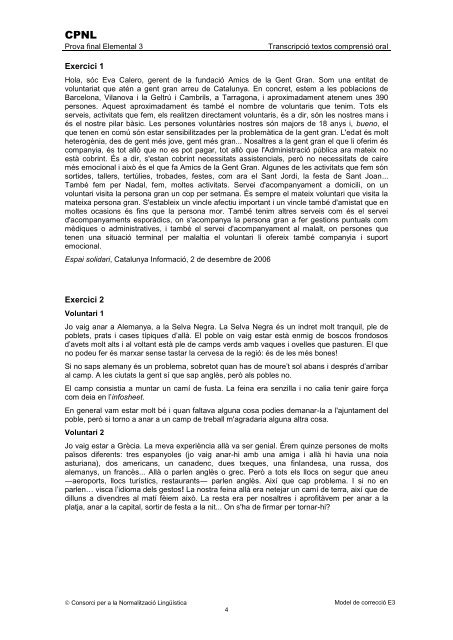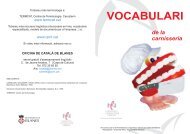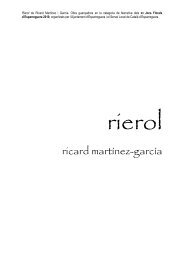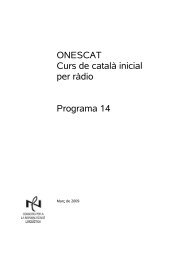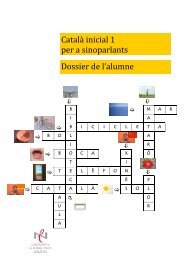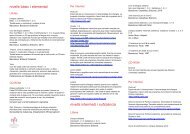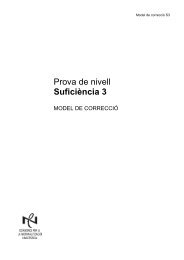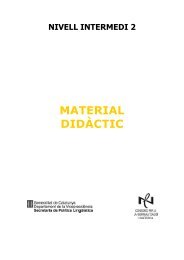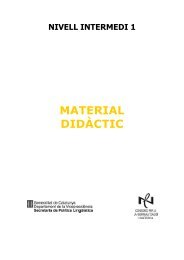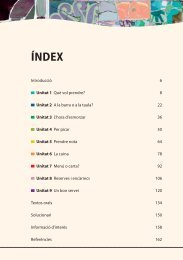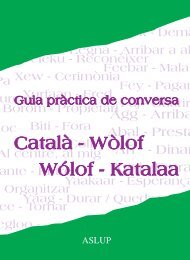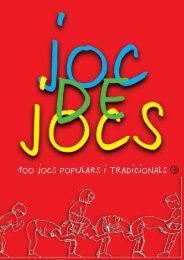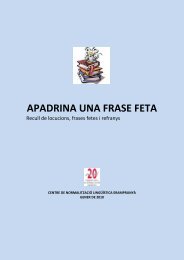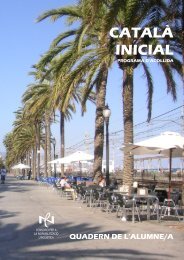Model de correcció - Consorci per a la Normalització Lingüística
Model de correcció - Consorci per a la Normalització Lingüística
Model de correcció - Consorci per a la Normalització Lingüística
Create successful ePaper yourself
Turn your PDF publications into a flip-book with our unique Google optimized e-Paper software.
CPNL<br />
Prova final Elemental 3 Transcripció textos comprensió oral<br />
Exercici 1<br />
Ho<strong>la</strong>, sóc Eva Calero, gerent <strong>de</strong> <strong>la</strong> fundació Amics <strong>de</strong> <strong>la</strong> Gent Gran. Som una entitat <strong>de</strong><br />
voluntariat que atén a gent gran arreu <strong>de</strong> Catalunya. En concret, estem a les pob<strong>la</strong>cions <strong>de</strong><br />
Barcelona, Vi<strong>la</strong>nova i <strong>la</strong> Geltrú i Cambrils, a Tarragona, i aproximadament atenem unes 390<br />
<strong>per</strong>sones. Aquest aproximadament és també el nombre <strong>de</strong> voluntaris que tenim. Tots els<br />
serveis, activitats que fem, els realitzen directament voluntaris, és a dir, són les nostres mans i<br />
és el nostre pi<strong>la</strong>r bàsic. Les <strong>per</strong>sones voluntàries nostres són majors <strong>de</strong> 18 anys i, bueno, el<br />
que tenen en comú són estar sensibilitza<strong>de</strong>s <strong>per</strong> <strong>la</strong> problemàtica <strong>de</strong> <strong>la</strong> gent gran. L'edat és molt<br />
heterogènia, <strong>de</strong>s <strong>de</strong> gent més jove, gent més gran... Nosaltres a <strong>la</strong> gent gran el que li oferim és<br />
companyia, és tot allò que no es pot pagar, tot allò que l'Administració pública ara mateix no<br />
està cobrint. És a dir, s'estan cobrint necessitats assistencials, <strong>per</strong>ò no necessitats <strong>de</strong> caire<br />
més emocional i això és el que fa Amics <strong>de</strong> <strong>la</strong> Gent Gran. Algunes <strong>de</strong> les activitats que fem són<br />
sorti<strong>de</strong>s, tallers, tertúlies, troba<strong>de</strong>s, festes, com ara el Sant Jordi, <strong>la</strong> festa <strong>de</strong> Sant Joan...<br />
També fem <strong>per</strong> Nadal, fem, moltes activitats. Servei d'acompanyament a domicili, on un<br />
voluntari visita <strong>la</strong> <strong>per</strong>sona gran un cop <strong>per</strong> setmana. És sempre el mateix voluntari que visita <strong>la</strong><br />
mateixa <strong>per</strong>sona gran. S'estableix un vincle afectiu important i un vincle també d'amistat que en<br />
moltes ocasions és fins que <strong>la</strong> <strong>per</strong>sona mor. També tenim altres serveis com és el servei<br />
d'acompanyaments esporàdics, on s'acompanya <strong>la</strong> <strong>per</strong>sona gran a fer gestions puntuals com<br />
mèdiques o administratives, i també el servei d'acompanyament al ma<strong>la</strong>lt, on <strong>per</strong>sones que<br />
tenen una situació terminal <strong>per</strong> ma<strong>la</strong>ltia el voluntari li ofereix també companyia i suport<br />
emocional.<br />
Espai solidari, Catalunya Informació, 2 <strong>de</strong> <strong>de</strong>sembre <strong>de</strong> 2006<br />
Exercici 2<br />
Voluntari 1<br />
Jo vaig anar a Alemanya, a <strong>la</strong> Selva Negra. La Selva Negra és un indret molt tranquil, ple <strong>de</strong><br />
poblets, prats i cases típiques d’allà. El poble on vaig estar està enmig <strong>de</strong> boscos frondosos<br />
d’avets molt alts i al voltant està ple <strong>de</strong> camps verds amb vaques i ovelles que pasturen. El que<br />
no po<strong>de</strong>u fer és marxar sense tastar <strong>la</strong> cervesa <strong>de</strong> <strong>la</strong> regió: és <strong>de</strong> les més bones!<br />
Si no saps alemany és un problema, sobretot quan has <strong>de</strong> moure’t sol abans i <strong>de</strong>sprés d’arribar<br />
al camp. A les ciutats <strong>la</strong> gent sí que sap anglès, <strong>per</strong>ò als pobles no.<br />
El camp consistia a muntar un camí <strong>de</strong> fusta. La feina era senzil<strong>la</strong> i no calia tenir gaire força<br />
com <strong>de</strong>ia en l’infosheet.<br />
En general vam estar molt bé i quan faltava alguna cosa podies <strong>de</strong>manar-<strong>la</strong> a l'ajuntament <strong>de</strong>l<br />
poble, <strong>per</strong>ò si torno a anar a un camp <strong>de</strong> treball m'agradaria alguna altra cosa.<br />
Voluntari 2<br />
Jo vaig estar a Grècia. La meva ex<strong>per</strong>iència allà va ser genial. Érem quinze <strong>per</strong>sones <strong>de</strong> molts<br />
països diferents: tres espanyoles (jo vaig anar-hi amb una amiga i allà hi havia una noia<br />
asturiana), dos americans, un cana<strong>de</strong>nc, dues txeques, una fin<strong>la</strong>n<strong>de</strong>sa, una russa, dos<br />
alemanys, un francès... Allà o parlen anglès o grec. Però a tots els llocs on segur que aneu<br />
―aeroports, llocs turístics, restaurants― parlen anglès. Així que cap problema. I si no en<br />
parlen… visca l’idioma <strong>de</strong>ls gestos! La nostra feina allà era netejar un camí <strong>de</strong> terra, així que <strong>de</strong><br />
dilluns a divendres al matí fèiem això. La resta era <strong>per</strong> nosaltres i aprofitàvem <strong>per</strong> anar a <strong>la</strong><br />
p<strong>la</strong>tja, anar a <strong>la</strong> capital, sortir <strong>de</strong> festa a <strong>la</strong> nit... On s'ha <strong>de</strong> firmar <strong>per</strong> tornar-hi?<br />
<strong>Consorci</strong> <strong>per</strong> a <strong>la</strong> <strong>Normalització</strong> <strong>Lingüística</strong> <strong>Mo<strong>de</strong>l</strong> <strong>de</strong> <strong>correcció</strong> E3<br />
4


